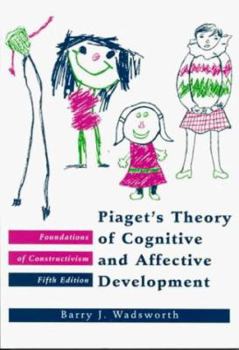Piaget's Theory of Cognitive and Affective Development: Foundations of Constructivism, 5th Edition
Select Format
Select Condition 
Book Overview
The aim of this fourth edition remains the same - to introduce students to Piaget's theory of how children construct and acquire knowledge. It has been updated and revised to incorporate the most... This description may be from another edition of this product.
Format:Paperback
Language:English
ISBN:0801307732
ISBN13:9780801307737
Release Date:January 1995
Publisher:Longman Pub Group
Length:195 Pages
Weight:0.70 lbs.
Dimensions:9.3" x 0.5" x 6.5"
Customer Reviews
2 ratings
The Piagetian Approach even works on Leadership
Published by Thriftbooks.com User , 17 years ago
If one accepts the theory of Jean Piaget, the Swiss Psychologist, as I and many other Professors of organizational behavior do- that all endeavors of human learning has some kind of order and logic. Similar to a drum major leading a marching band, he/she must know which route to take and what signals to give, but above all to stay ahead of the band. When one as a leader start to view workers or groups as needing instructions much like young students,two main findings will emerge. First, no longer will leaders underestimated as to what followers know or why they do a task a certain way. Nor will the leader fail to spend a fair amount of training. Secondly, there will be one dominant way to expose, correct and teach them if one analyzes them first. No question leaders will lead differently, but more importantly,they will do it more effectively. This in short is the Piaget's theory. While Piagetian theory has been used in child development and education for decades, I started using it as a basis for teaching the principles of leadership in 1995. With executive training, there is backround literature lecture given first and mini case studies later. But in the classroom,I require my students to explore, study and discuss the literature. This expose them to how leadership evolved over time by culture, religion, etc ..(This is Piaget's principle in believing the way to understand anything is to understand how it evolves). I start off with Gilgamesh epic of Homer to the teaching of leadership from a host of thinkers (such as Erasmaus,Tyndale, Shakespeare, to Caryle's heroes essay as well as Max Weber's model of charismatic leadership). Then my students are able to discuss how one become a leader or a hero and why they fail ... using myths, fables and legends of well know leaders. Then we apply the modern theories of emotional intelligence(Goleman et al)to classic leadership models, wow what a difference. This book on Piaget Theories taught us that when humans are learning something new, they tend to divide the task or experience into one of two schemes- assimilate it based on old experiences or create an entirely new scheme to deal with it. Piaget suggests that all new tasks have some emotional aspects to them and they are divided up in the mind of a follower/worker. Thus,the leader must learn to educate his subjects either by using acts of training, rewarding or inspiring his/her followers around these emotional realtiies. Once the leader/teacher understand the range of emotions a new direction or a change will cause, and they go from fear, distrust to reckless acceptance. For example, an emotion (hope, trust) may assist in the follower learning something new or if there is a negative emotion (fear, distrust, anger, etc), it becomes a barrier. Situationally, leaders must know, anticipate and act accordingly. If one practices that we humans are life long active builders of knowledge rather than just receivers of information then, it can be inco
Piaget's Theory of Cognitive and Affective Development 3rd Edition
Published by Thriftbooks.com User , 19 years ago
This book has evolved out of the first two editions of Piaget's Theory of Cognitive Development. It's aim remains the same: to introduce the education and psychology student to Jean Piaget's theory in an undistorted conceptual manner...While the earlier books focused primarily on Piaget's work on cognitive and intellectual development, this volume also examines his extensive studies on affective development, a rich body of work that has largely been overlooked by psychologists and educators. I have also incorporated the most important developments in Piagetian theory of the last ten years. My goal is to show the reader that there are many rewards in understanding Piaget's work. --- excerpt from Preface quoted on book's back cover






